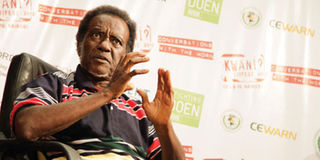Conversations with writers on peace in Africa

PHOTO | CORRESPONDENT Ghanaian author Kojo Laing speaks at the Litfest.
What you need to know:
- Kwani? Litfest provided a platform for literary minds from across the continent to debate the role of their work in resolving conflict
Kwani? Trust’s fourth biennial Literary Festival started on December 9 at the Kifaru Gardens in Westlands and closed on December 16 atop the KICC.
The theme of the festival this year was “Conversations With The Horn: Writers, Artists in Exchange”. The purpose of the event was to bring together Africa’s best and emerging writers together to explore and celebrate literature and its role in the continent.
The event featured various literary activities, including readings, performances, writers in conversation, public lectures, panel discussions, film screenings, art exhibitions, workshops and music.
Organisers
The organisers hosted prominent Somali poet Hadraawi, Sudanese-British novelist Jamal Mahjoub as well as Eritrean writer and historian Alemsegad Tefsayi.
Others included Egyptian writer and activist Nawal El Sadaawi, Nigerian novelist Helon Habila and Ghanaian novelist Kojo Laing.
The programme of events had literary enthusiasts travelling across Nairobi — from Kifaru Gardens to Eastleigh, Habesha Restaurant in Kilimani to the University of Nairobi in the city centre.
The festival was opened by Mahboub Maalim, the IGAD executive secretary, who led a discussion on conflict and the peace process in Eastern Africa.
Hadraawi then gave a speech before reading two of his poems and taking questions from the audience on a range of topics, including his thoughts on K’naan, a renown Somali Canadian singer and poet, and the role of poetry in politics.
Hadraawi, whose poems promote peace and social justice, is widely acclaimed as one of Somalia’s greatest living poets.
Other performers on the opening day included novelist Chuma Nwokolo and poet Chehem Watta from Nigeria and Djibouti, respectively.
Two sessions — Narratives of the Horn: The Place of the Story and Narratives of Peace and Conflict: The Place of Arts, Culture and Literature — explored the various aspects of war in the region and the role of literary artists in peace and conflict resolution.
Writer and historian Alemsegad Tefsayi emphasised the need for artists to be conversant with the history and the context of their audiences and apply themselves to this.
Said Jama Huseein, a political and cultural analyst, observed that poetry has been greatly influential in Somalia, both in times of peace and war.
The panellists also tackled the issue of how conflict in the Horn is reported as well as the relationship between writers and politicians in the region.
Also tackled were writing styles and techniques, fashioned as a conversation between Kojo Laing and Kenya’s Binyavanga Wainaina.
Contemporary African novel
The contemporary African novel was also not left behind. One of the sessions on it was led by Nigerian Caine Prize winner Hellon Habil at the University of Nairobi, who discussed the novel’s departure from tradition and its future, while Kenyan novelists led another where they discussed their work in the genre at the National Museum.
All Litfest panel sessions were led by cross-generational artists who addressed an eager, mostly youthful audience, which made for interesting discussions.



